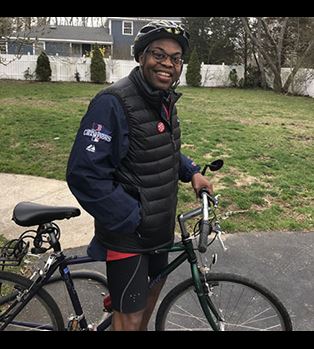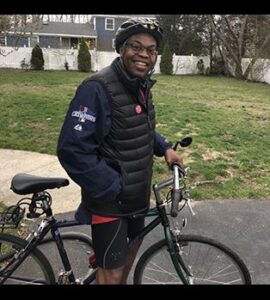
30 Dec The power of sharing your story
The following article was originally published by American Stroke Association on December 6, 2021 on their website.
Three years after Debra’s stroke, we finally had to accept that all the therapy and hard work in the world wasn’t going to put her stroke in the rearview mirror. Unfortunately, the stroke wasn’t going to be “just a several-year blip” as we – wired to be optimists – had hoped from the beginning.
Debra was committed to having meaning and purpose in her life, so she decided to write a book about stroke recovery, despite her severe expressive aphasia. Her motivation at first, in truth, was mostly to prove she could. She was unwilling to give up her identity as an academic, even though she had to give up her faculty job. Fortunately for us Debra had studied and taught about identity during her career, and she turned that lens on herself.
The book-writing process quickly became something very different. It was a journey through which she began rebuilding her identities in the face of her very different capabilities. Understanding and articulating her own story – deciding what was important and putting it down on paper – was a critical step in her process to rebuild a rewarding life after stroke.
Storytelling is an art form that’s as old as human civilization. For centuries, it was the principal way people were educated and history was preserved. It’s a great form of entertainment, whether sitting around a campfire or at a holiday dinner with family. Marketers will tell you that good stories can be the best way to attract customers, build relationships, and sell your product or service.
We’ve personally found storytelling to be equally important in stroke recovery – more specifically, the emotional journey in recovery to rebuild our identities and rewarding lives. And in our work at Stroke Onward, we are seeing three distinct ways that storytelling is helpful.
Storytelling helps the storyteller
Debra’s writing of her story, and telling it since, has been critical to her recovery. Speech therapists we’re working with see the power of storytelling far beyond helping people with aphasia to improve their speech.
“Stories are used to make meaning from traumatic events,” says Katie Strong, assistant professor of speech language pathology at Central Michigan University and director of the Strong Story Lab. “Thinking about the past, present, and future as a story is a powerful way to move forward from the trauma.”
A major project for Stroke Onward this year was to develop materials to support book groups for survivors (and others) to discuss Identity Theft as a way to advance their own emotional journeys in recovery.
Our colleague Jodi Kravitz partnered on this work with Ellen Bernstein-Ellis, director of the Aphasia Treatment Program at Cal State East Bay, and Dr. Elizabeth Hoover, clinical professor at the Department of Speech Language and Hearing Sciences at Boston University. One central goal was to develop aphasia-friendly materials to support broader accessibility. They developed book discussion group materials with colleagues and students and led weekly book groups for survivors.
“The process was helpful in so many ways,” Hoover said. “One of the most powerful was how participants, discussing a book that artfully used storytelling to explore the author’s recovery, began to build and practice their own personal narratives and tell stories about their journeys of recovery in ways they never had before. You could just see how the process was opening them up to new and more attractive possibilities for life with aphasia.”
Storytelling helps other survivors
Through our work at Stroke Onward we now tell our story – or parts of it, really – quite often. We usually hear afterward (or in virtual chats these days) how much our storytelling helps other survivors think about their stories. Many survivors have reached out to share how our stories, especially Debra’s delivered through the challenges of aphasia, have given them the courage to further explore and share their own. And how doing so has advanced their recoveries.
A recent email is a great example of how storytelling by one can help others directly and create a ripple effect beyond. “Your book, and your willingness to tell your story, has been an inspiration to us,” said Carolyn Obel-Omia, whose husband Michael, who has aphasia, decided to share his story through a book of poetry.

Michael Obel-Omia
Storytelling helps health care teams
Storytelling not only helps survivors, but also those who care for them, experts say. “In order to be open to exploring your client’s life story, you must also be open to exploring your own life story as a clinician (and a person),” Strong and Barbara Shadden, professor emeritus at the University of Arkansas and a luminary in aphasia research, wrote in an article titled “The Power of Story in Identity Renegotiation: Clinical Approaches to Supporting Persons Living with Aphasia.”
“Experiencing how this process may feel to your clients can provide you with insights into how to support them,” they wrote.
And Katie shared with us recently, “The process of co-constructing stories (client with therapist) can be transformative, leading to positive changes in how we view ourselves-how we rebuild our identities.”
The dynamic involving the interplay between survivor and clinician, and the benefits to both, was clearly evident in our book group activities. After the initial development process, we partnered with seven other institutions to run “beta pilots” before making our book group discussion guides available on our website to all who might want to use them.
A student clinician who participated in a beta pilot shared in her post project survey: “These stories gave me a much more ‘human’ perspective on the emotional recovery and the breadth of these emotional needs in stroke survivors. It gave me a lot of insight regarding the emotional aspects of recovery and what kind of support these individuals might need.”
Tell your story
Experts encourage storytelling while rebuilding identities, and so do we. Every time we tell our story, we grow-as individuals and as a couple. It reminds us of who we are. It makes us think more deeply about who we want to be. The conversations we have – with survivors, carepartners, professional caregivers and students – always leave us thinking more deeply about the choices we have made, and those we now have in front of us.
And, while we are thrilled that it appears our storytelling is helpful to those who hear it, often with comments about Debra’s courage to tell her story through the challenges of aphasia, we know the value of those sessions flows equally to us.
So please, tell your story to help your own recovery – and for the benefit of all.
We’d love to hear from you. If you have thoughts about this column, experiences you’d like to share, ideas for us to explore further, or input of any kind, please email us at connect@strokeonward.org.

Sorry, the comment form is closed at this time.